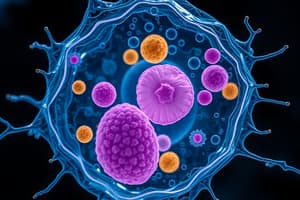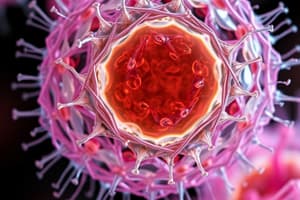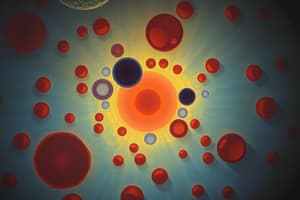Podcast
Questions and Answers
Which neurotransmitter is primarily associated with the sympathetic nervous system?
Which neurotransmitter is primarily associated with the sympathetic nervous system?
What is the primary function of the autonomic nervous system?
What is the primary function of the autonomic nervous system?
How does the blood transport various substances?
How does the blood transport various substances?
What process occurs in the alveoli during respiration?
What process occurs in the alveoli during respiration?
Signup and view all the answers
What is the primary purpose of capillary exchange in the body?
What is the primary purpose of capillary exchange in the body?
Signup and view all the answers
What is one of the primary functions of the musculoskeletal system?
What is one of the primary functions of the musculoskeletal system?
Signup and view all the answers
Which of the following body systems is NOT mentioned as part of the overview?
Which of the following body systems is NOT mentioned as part of the overview?
Signup and view all the answers
Which type of muscle is responsible for voluntary movements?
Which type of muscle is responsible for voluntary movements?
Signup and view all the answers
What role does the spinal cord play in the nervous system?
What role does the spinal cord play in the nervous system?
Signup and view all the answers
What is the primary function of the reflex reaction?
What is the primary function of the reflex reaction?
Signup and view all the answers
Which body system is primarily involved in defending against pathogens?
Which body system is primarily involved in defending against pathogens?
Signup and view all the answers
What is the primary focus of the module?
What is the primary focus of the module?
Signup and view all the answers
Which of the following structures is NOT part of a eukaryotic (animal) cell?
Which of the following structures is NOT part of a eukaryotic (animal) cell?
Signup and view all the answers
What type of neurons does the somatic nervous system utilize?
What type of neurons does the somatic nervous system utilize?
Signup and view all the answers
What percentage of the assessment is contributed by the final written exam?
What percentage of the assessment is contributed by the final written exam?
Signup and view all the answers
Which part of the brain is primarily responsible for processing sensory information?
Which part of the brain is primarily responsible for processing sensory information?
Signup and view all the answers
What is the main purpose of protein synthesis in cells?
What is the main purpose of protein synthesis in cells?
Signup and view all the answers
What occurs during the process of mitosis?
What occurs during the process of mitosis?
Signup and view all the answers
Which part of the nervous system is specialized for involuntary movements?
Which part of the nervous system is specialized for involuntary movements?
Signup and view all the answers
Which of the following is a function of the hypothalamus?
Which of the following is a function of the hypothalamus?
Signup and view all the answers
What is the outcome expected from understanding the interconnections between body systems?
What is the outcome expected from understanding the interconnections between body systems?
Signup and view all the answers
Study Notes
Cell Biology
- The animal cell is eukaryotic
- The cell contains the genetic information
- DNA
- RNA
- Protein
- Protein synthesis involves two stages: transcription and translation
- Cellular respiration: cells break down sugar molecules to create energy
- Cell division: process by which cells create new cells
- Mitosis: identical cell copies
- Meiosis: genetic material recombines
Overview of Body Systems
- All systems are interconnected
The Musculoskeletal System
- Provides support for the body
- Protects organs
- Enables movement
- Calcium and phosphate homeostasis
- Blood cell production
Types of Muscles
-
Three types of muscle:
- Skeletal: voluntary, attached to skeleton
- Cardiac: involuntary, covers walls of heart
- Smooth: involuntary, covers walls of internal organs
The Motor Unit
- A motor neuron and all the muscle fibers it innervates
- Controls muscular contractions
The Reflex Reaction
- Rapid, involuntary response to a stimulus
The Nervous System
- Collects information from the internal and external environment
- Processes collected information
- Sends information to appropriate parts of the brain and body
- Brain: responsible for learning, reasoning, speech, senses, and movement
- Spinal cord: transmits information from the brain to the body
- Peripheral nervous system: connects the CNS to organs and limbs
The Peripheral Nervous System
-
Somatic Nervous System: controls voluntary movements
- Sensory neurons: collect information from the body
- Motor neurons: send information to the muscles
-
Autonomic Nervous System: controls involuntary movements
- Sympathetic nervous system: "fight or flight" response, releases adrenaline
- Parasympathetic nervous system: rest and digest response
The Cardiovascular System
- Delivers oxygen and nutrients to body organs
- Removes waste products
-
Circulation:
- Systemic circulation: blood flow throughout the body
- Pulmonary circulation: blood flow between the heart and lungs
The Heart
- Four chambers: right atrium, right ventricle, left atrium, left ventricle
- Blood flow: deoxygenated blood enters the right atrium, then right ventricle, pumped to the lungs, oxygenated blood returns to the left atrium, then left ventricle, pumped to the body
Blood Pressure
- The force of blood against the walls of blood vessels
- Systolic blood pressure: highest pressure during contraction
- Diastolic blood pressure: lowest pressure during relaxation
Blood Vessels
- Three types: arteries, veins, capillaries
- Arteries: carry oxygenated blood away from the heart
- Veins: carry deoxygenated blood back to the heart
- Capillaries: where exchange of nutrients and waste products takes place between blood and body tissues
The Blood
- Components:
- Red blood cells: carry oxygen
- White blood cells: part of the immune system
- Platelets: help with blood clotting
The Respiratory System
- Responsible for gas exchange (oxygen and carbon dioxide) between the body and the environment
- Alveoli: tiny air sacs in the lungs where gas exchange takes place
Studying That Suits You
Use AI to generate personalized quizzes and flashcards to suit your learning preferences.
Related Documents
Description
Test your knowledge on cell biology and the musculoskeletal system. This quiz covers topics like cell structure, protein synthesis, and muscle types, as well as body systems and reflex reactions. Perfect for students studying biology or related fields!




